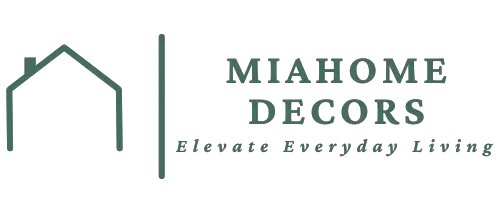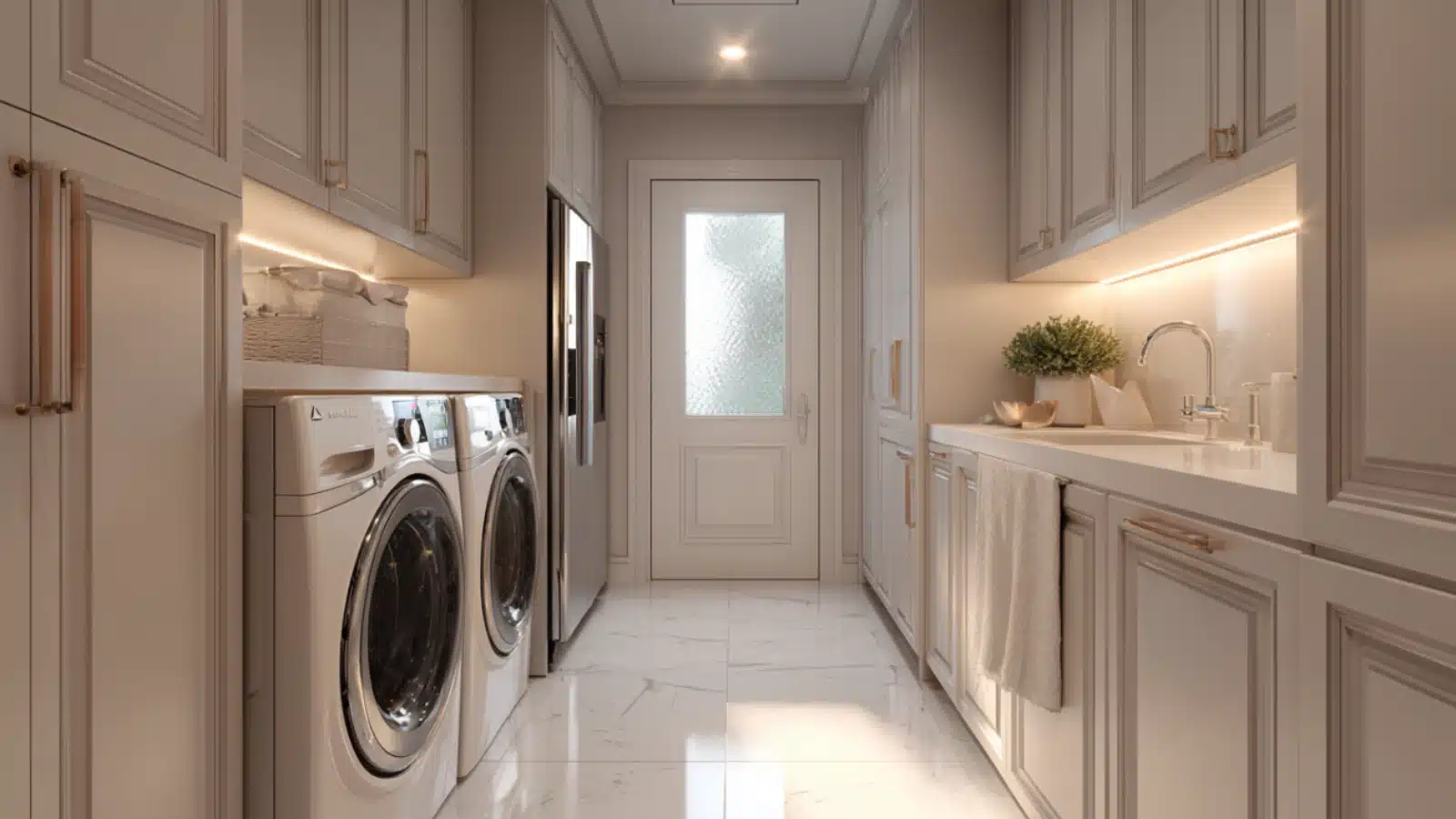10 Stunning Laundry Room Flooring Ideas That Instantly Elevate Your Home Decor
Table of Contents
The laundry room may not be the first space that comes to mind when thinking of stylish home design, but it’s quickly becoming one of the most reinvented areas in modern homes. According to a recent Houzz study, over 60% of homeowners renovating their laundry rooms now consider design equally important as functionality. And one of the biggest impact-makers in any laundry room transformation? Flooring.
Flooring is more than just the surface underfoot—it sets the tone for the entire room. Whether you’re aiming for a sleek modern aesthetic or a cozy farmhouse vibe, the right flooring can unify your decor and enhance your home’s overall look. Plus, in a room that regularly faces water, spills, and heavy foot traffic, choosing the right material matters.
In this article, we’ll explore 10 stunning laundry room flooring ideas that perfectly balance style, durability, and function. From chic ceramic tile to eco-friendly cork, we’ll break down the pros and cons, give practical styling advice, and show you how each option can transform your laundry room from purely utilitarian to undeniably beautiful.
Classic Ceramic Tile for Timeless Elegance
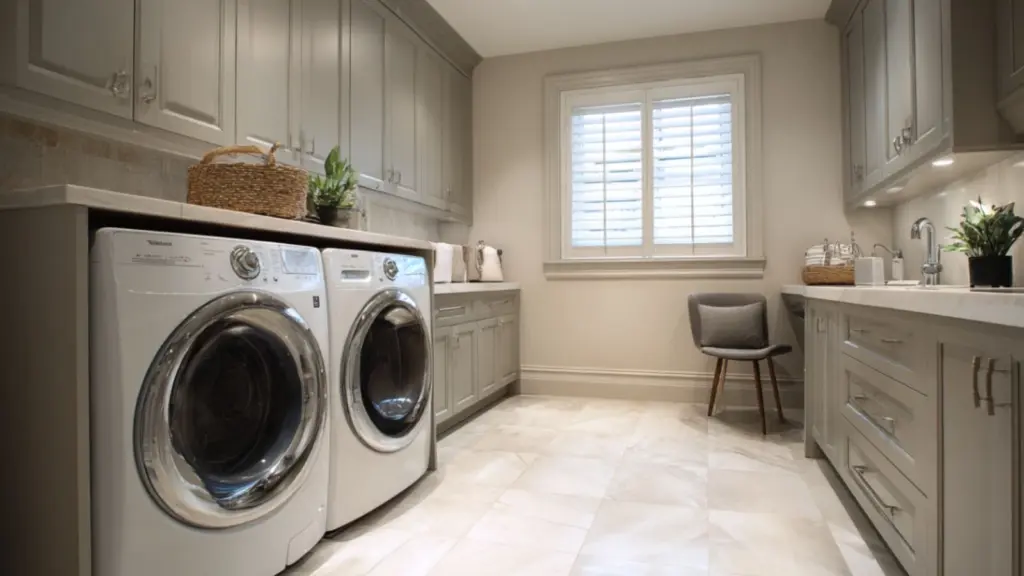
Ceramic tile has long been a favorite for laundry rooms, and for good reason—it’s both stylish and incredibly practical. Available in endless colors, sizes, and patterns, ceramic offers a clean, polished look that can suit just about any home decor style. Whether you want sleek whites for a minimalist look or patterned tiles for added personality, ceramic can deliver.
Ceramic is moisture-resistant, easy to clean, and highly durable. It can stand up to the inevitable splashes and spills of laundry day without staining or warping. Pair it with a patterned grout or even mosaic accents to give your floor extra flair.
Design Tip: If you’re working with a small laundry space, consider light-colored ceramic tiles in a diagonal layout. This visual trick can make the room appear larger and more open.
| Pros | Cons |
|---|---|
| Water-resistant | Can be cold underfoot |
| Easy to clean | Hard surface may cause breakage if items fall |
| Durable | Grout may require maintenance |
| Wide design variety | Installation can be labor-intensive |
Vinyl Plank Flooring for a Modern, Budget-Friendly Look
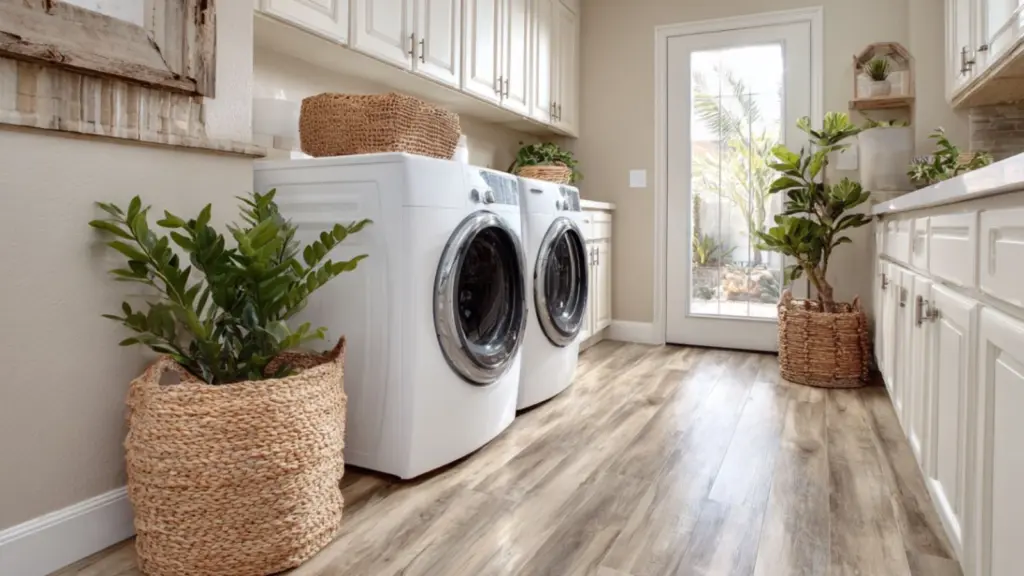
Luxury vinyl plank (LVP) flooring is one of the most popular choices for today’s laundry rooms, especially for homeowners who want the look of hardwood without the high maintenance. LVP is engineered to mimic natural wood grain while offering excellent water resistance and a softer, more comfortable feel underfoot.
It’s also budget-friendly and relatively easy to install, making it ideal for DIY enthusiasts. From rustic oak tones to sleek gray finishes, vinyl plank flooring can easily match your interior design goals without sacrificing practicality.
Design Tip: Use wide planks in a herringbone layout to create visual interest and make a statement in a traditionally overlooked room.
| Pros | Cons |
|---|---|
| Water-resistant | May dent under heavy furniture |
| Wood-look finish | Lower resale value than real wood |
| Comfortable feel | Quality varies by brand |
| DIY-friendly | May fade with prolonged sunlight exposure |
Natural Stone for Rustic Charm and Luxury Appeal
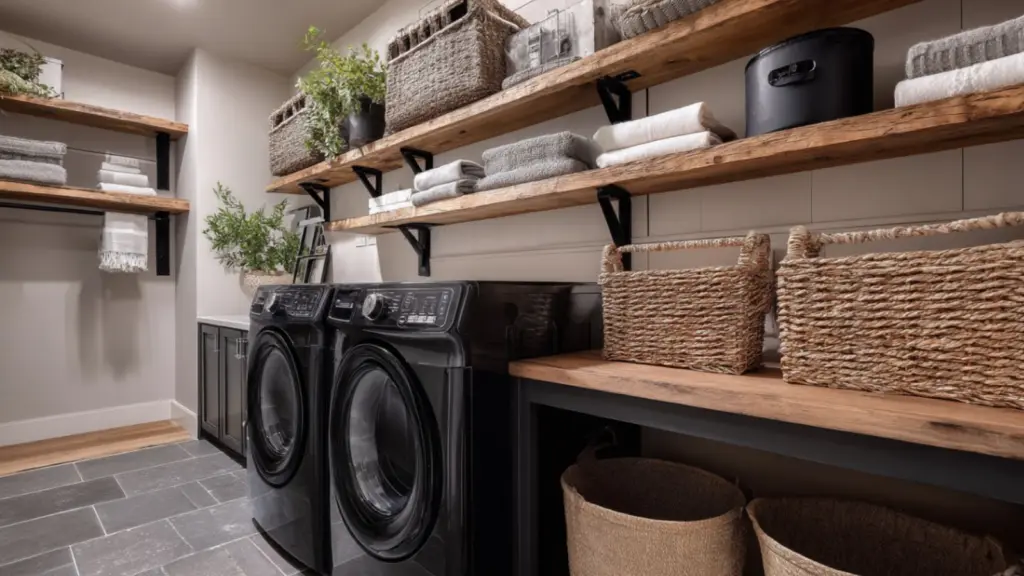
If you’re after a high-end, sophisticated aesthetic, natural stone flooring—like slate, travertine, or marble—offers unmatched beauty and uniqueness. Every stone tile features natural variations in pattern and tone, giving your laundry room an organic, luxurious vibe.
Stone is highly durable and, with proper sealing, resists water damage. It pairs well with both modern and traditional design styles and adds significant value to your home.
Design Tip: Combine stone flooring with reclaimed wood shelving or wrought iron accents for a warm, rustic-meets-industrial look.
| Pros | Cons |
|---|---|
| Unique, natural patterns | Expensive upfront cost |
| Durable | Requires sealing and maintenance |
| Adds resale value | Can be cold and hard underfoot |
| Water-resistant when sealed | Heavy and may need reinforced subfloor |
Porcelain Tile That Combines Beauty and Strength
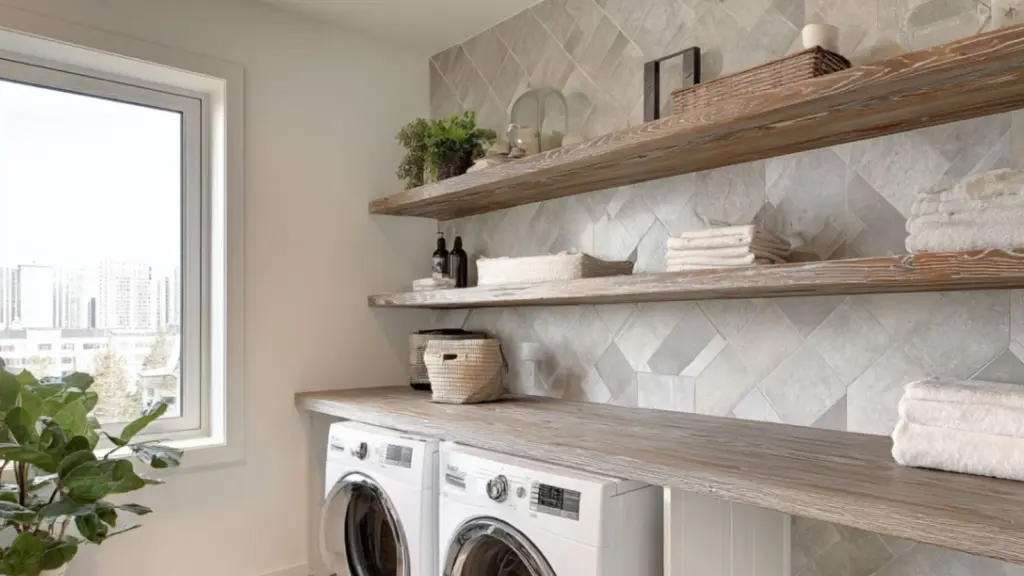
Porcelain tile is often confused with ceramic, but it’s actually a denser, more durable option—perfect for laundry rooms that see frequent use. With low water absorption rates and resistance to stains and scratches, porcelain is a great pick for households with pets or children.
Available in styles that mimic wood, stone, or even concrete, porcelain can fit seamlessly into virtually any decor scheme. For a minimalist or industrial look, opt for large-format tiles in matte gray.
Design Tip: To warm up porcelain’s cool, hard feel, add plush area rugs or textured mats near high-traffic zones like the washer and dryer.
| Pros | Cons |
|---|---|
| Extremely durable | Can be more expensive than ceramic |
| Water and stain resistant | Heavy and hard to cut |
| Wide range of styles | Can feel cold and hard |
| Low maintenance | Professional installation recommended |
Eco-Friendly Cork Flooring That’s Soft and Sustainable
For those who value comfort and sustainability, cork flooring is an excellent laundry room option. It’s soft underfoot—ideal if you spend long periods folding or ironing—and provides natural insulation against sound and temperature changes.
Cork is also renewable and antimicrobial, making it a healthier choice for allergy sufferers. When sealed properly, it’s resistant to moisture, though it may not be the best fit for extremely wet laundry spaces.
Design Tip: Pair cork flooring with natural textiles and warm color palettes for a cozy, earthy laundry room ambiance.
| Pros | Cons |
|---|---|
| Eco-friendly | Requires regular sealing |
| Comfortable feel | Susceptible to moisture without sealing |
| Naturally antimicrobial | Fades in direct sunlight |
| Insulating properties | Softer than tile—may dent |
Patterned Cement Tiles for Bold Personality
Want your laundry room to have that designer flair? Patterned cement tiles are a fantastic way to inject color and character into the space. From Moroccan prints to geometric designs, these tiles can become a stunning focal point in an otherwise neutral room.
While cement tiles are heavier and require sealing, the payoff in style is significant. They’re especially fitting for eclectic, bohemian, or vintage-inspired interiors.
Design Tip: Balance bold tiles with simple cabinetry and neutral wall colors to let the flooring shine without overwhelming the space.
| Pros | Cons |
|---|---|
| Visually striking | Requires sealing and maintenance |
| Durable | Can stain if not properly sealed |
| Customizable patterns | More costly than standard tile |
| Adds personality | Heavier than ceramic/porcelain |
Waterproof Laminate Flooring: Beauty Meets Practicality
If you’re seeking a balance between aesthetics, affordability, and water resistance, waterproof laminate flooring is a solid contender. This newer generation of laminate has come a long way from its plastic-looking predecessors. It now convincingly mimics hardwood, stone, and even tile—while offering an added layer of protection against moisture.
Waterproof laminate uses a special core that prevents swelling when exposed to water, making it ideal for laundry rooms where leaks or splashes can occur. It’s also scratch-resistant and easy to clean, which makes maintenance a breeze.
Installation is relatively simple with a click-lock system, and many DIYers report success doing it themselves over a weekend. It’s softer than tile, warmer underfoot, and comes in a wide range of finishes, from weathered gray oak to rich walnut.
Example Styling Ideas:
- For a coastal look, choose whitewashed or driftwood-style planks with navy and cream decor.
- For farmhouse charm, opt for warm oak or distressed pine paired with vintage accessories and soft textiles.
| Pros | Cons |
|---|---|
| Waterproof and durable | Not as long-lasting as tile or stone |
| Mimics natural materials | May not increase resale value significantly |
| DIY installation-friendly | Limited repair options if damaged |
| Comfortable and stylish | Can be slippery when wet |
Painted Concrete: Industrial, Minimal, and Customizable
Sometimes the best solution is the one already beneath your feet. If your laundry room sits atop a concrete subfloor, consider painting it for an affordable, customizable, and industrial-chic flooring option.
Concrete paints have evolved to offer water resistance, durability, and slip protection. You can choose matte finishes for a raw, minimalist vibe or gloss coatings for a polished look. Best of all, paint allows for total creative control—you can stencil patterns, create faux tiles, or add metallic flakes for a more modern edge.
Maintenance is easy, especially with an epoxy topcoat that resists stains and wear. And since paint is one of the most budget-friendly upgrades available, it’s ideal for renters or homeowners on a tight budget.
Creative Applications:
- Use stencils to mimic tile or Moroccan patterns.
- Paint with a charcoal base and white speckles for an urban loft effect.
- Go for pale blue or sage green for a calming, spa-like laundry nook.
| Pros | Cons |
|---|---|
| Highly customizable | Needs proper surface preparation |
| Inexpensive | May need repainting over time |
| Industrial, modern aesthetic | Can feel cold or sterile without added decor |
| Great for DIYers | Requires good ventilation during application |
Conclusion
Choosing the right flooring for your laundry room is more than a cosmetic upgrade—it’s a practical investment in your home’s comfort, style, and functionality. From classic ceramic to bold cement tiles and eco-friendly cork to waterproof laminate, each option offers unique benefits tailored to different needs and tastes.
By aligning your flooring choice with both your lifestyle and design aesthetic, you can transform your laundry room into a space that’s not only highly functional but also a joy to spend time in. So whether you’re embarking on a full renovation or a simple refresh, let your flooring set the foundation for beautiful design.
